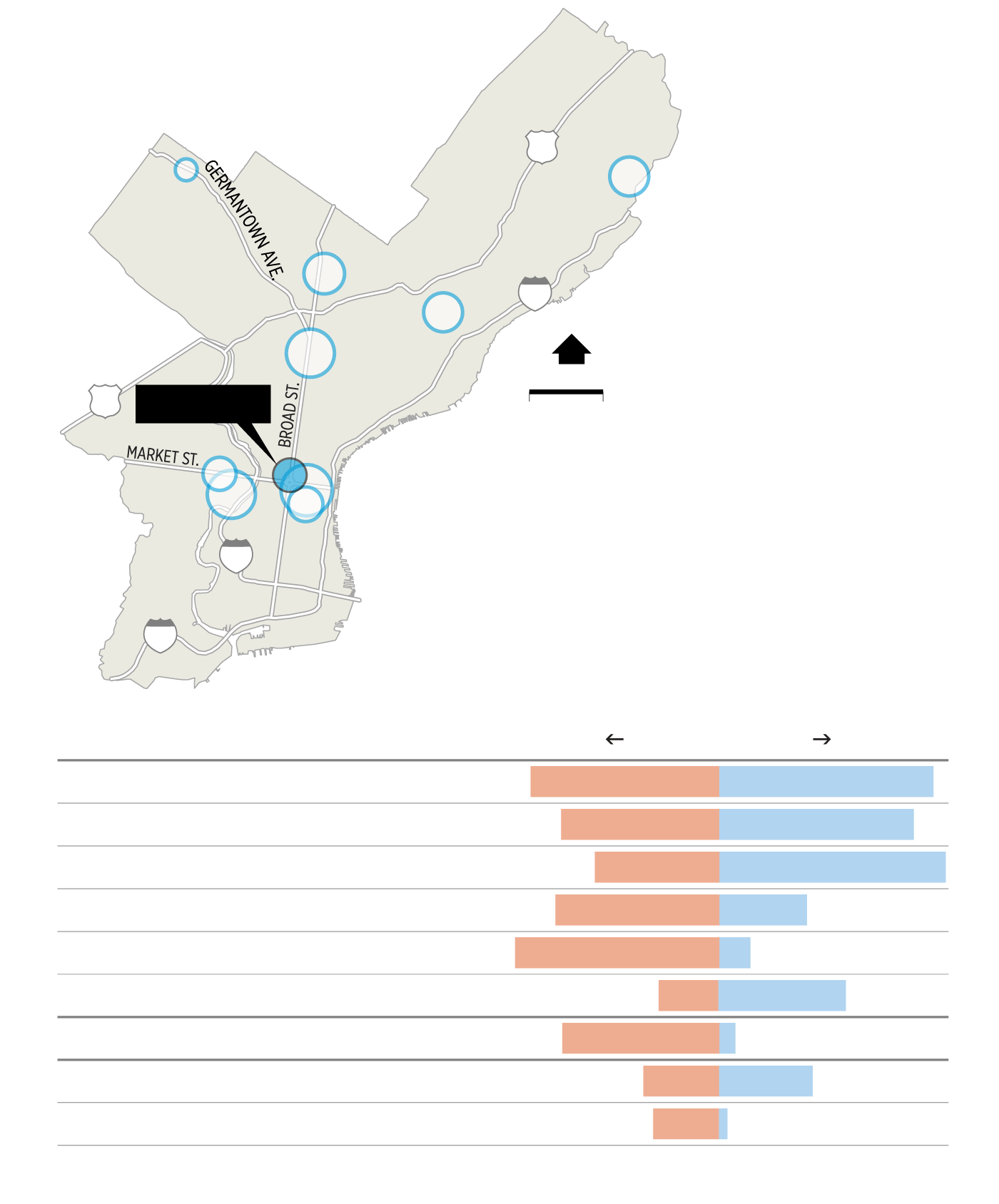Tips for finding new health care: What Hahnemann patients and others should know
Hahnemann University Hospital says it plans to close its Center City facility. Here's what anyone seeking a new medical provider should know.

Hahnemann University Hospital this week announced plans to close its 496-bed Center City facility, igniting protest from staff and prompting pushback from state officials, who ordered the hospital to halt its closure until an approved plan for patients is in place.
While the future of the 171-year-old medical institution hangs in the balance, if the hospital closes by Sept. 6 as announced, most Hahnemann doctors will remain in their practices, according to the hospital. However, some patients unable to stay with their doctor may also consider new medical care.
We talked to experts and compiled tips to keep in mind when switching medical care providers, whether your medical facility closes, you move, or your doctor goes elsewhere.
Transferring your medical records to a new provider
When it comes to requesting your medical records, it’s important to know your rights.
Under the Health Insurance Portability and Accountability Act (HIPAA), you’re entitled to copies of your medical records, whether they’re held by health care providers or your insurance company, and regardless of whether you owe your current health provider money.
The first place to look for your information: your health care provider’s online patient portal.
There, you may be able to request your records, or you may need to fill out a release form, according to the Office of the National Coordinator for Health Information Technology. You may also be charged a “reasonable fee” for copies of the records, according to the office.
Hahnemann patients can request records by calling the Medical Records Department at 215-762-7680, according to the hospital.
“Hahnemann University Hospital has made arrangements for the off-site storage of medical records," the hospital’s website says. "More information on requesting a copy of your medical records after the closure will be provided at a later date.”
Finding a new doctor
If you’ve had a long relationship with your doctor, finding new medical care can be daunting.
First, contact your insurance provider to check which providers are covered by your network. Then, make sure they meet your needs. Several sites, such as those of insurance companies, the American Medical Association, and U.S. News & World Report, offer search tools for finding medical professionals by specialty near you.
On its website, Independence Blue Cross, the Philadelphia area’s largest health insurer, also recommends considering the location of the office, the days and hours the doctor sees patients, and making sure you feel comfortable on the phone and during face-to-face meetings with the physician and office staff.
Transferring your prescriptions
Looking for a new pharmacy? Shop around and call ahead, recommends Tori Marsh, a health insights analyst with GoodRx.
Cash prices can vary widely between pharmacies, so using a website or app such as GoodRx or WeRx can help locate the best prices and coupons for specific drugs at pharmacies near you, Marsh said.
Pharmacy prices can change drug by drug, so taking the time to shop around can save up to hundreds of dollars for certain drugs, Marsh said.
She also recommends calling the pharmacy to make sure your drug is in stock, and developing a relationship with the pharmacist.
“Finding a pharmacist that you trust, that you can have over-the-counter interactions with, and talk to about insurance issues is important,” Marsh said.
And if you’re transferring a prescription, GoodRx advises having the name, strength, prescription numbers of each prescription handy, along with the phone number of your old pharmacy, your insurance information, and a list of any allergies.
Emergency treatment
Hahnemann says its emergency room will close in August. In 2017, the facility had more than 15,000 emergency-room admissions, the fifth-highest in the area.

For Hahnemann,
A High Proportion
Of ER Admissions
Hahnemann University Hospital had more than 15,000 inpatient admissions from emergency-room visits in 2017, the fifth-highest total among major Philadelphia hospitals. But Hahnemann struggled to attract admissions from other sources, totaling less than a tenth of the non-ER admissions compared with hospitals affiliated with Jefferson, Temple, or the University of Pennsylvania.
1
9
5*
4
95
5*
N
2
MILES
1
Hahnemann
0
2
8
7
1
Chart only includes hospitals identified by state data as having comprehensive ER units, and exclude children’s hospitals. Circle sizes are proportional to total visits in 2017.
3
6
76
95
Total inpatient
admissions
in 2017
Inpatient admissions from
ER visits
Non-ER
Hospital
1
Jefferson University Hosp.
39,973
18,714
21,259
2
Temple University Hosp.
35,009
15,683
19,326
3
34,820
Hosp. of the Univ. of Pa.
12,355
22,465
4
Einstein Medical Center
24,962
16,281
8,681
5
Jefferson Health-Northeast*
23,342
20,267
3,075
6
Pennsylvania Hospital
18,569
5,918
12,651
7
Hahnemann University Hosp.
17,179
15,572
1,607
8
16,807
Penn Presbyterian Med. Ctr.
9,299
7,508
9
Chestnut Hill Hospital
7,360
6,504
856
* Includes Jefferson Torresdale, Frankford, and Bucks Hospitals
SOURCE: Pennsylvania Department of Health
JOHN DUCHNESKIE / Staff Artist

For Hahnemann, A High
Proportion of ER Admissions
Hahnemann University Hospital had more than 15,000 inpatient admissions from emergency-room visits in 2017, the fifth-highest total among major Philadelphia hospitals.
But Hahnemann struggled to attract admissions from other sources, totaling less than a tenth of the non-ER admissions compared with hospitals affiliated with Jefferson, Temple, or the University of Pennsylvania.
1
9
5*
4
95
N
5*
MILES
2
1
0
2
Hahnemann
8
7
1
Chart only includes hospitals identified by state data as having comprehensive ER units, and exclude children’s hospitals. Circle sizes are proportional to total visits in 2017.
3
6
76
95
Inpatient admissions in 2017
Hospital
Non-ER
ER visits
Jefferson
Univ. Hosp.
18,714
21,259
1
Temple
Univ. Hosp.
15,683
19,326
2
Hosp. of the
Univ. of Pa.
12,355
22,465
3
Einstein
Medical Ctr.
4
16,281
8,681
Jeff. Health-
Northeast
5
20,267
3,075
Pennsylvania
Hospital
6
5,918
12,651
Hahnemann
Univ. Hosp.
15,572
1,607
7
Penn
Presbyterian
8
9,299
7,508
Chestnut Hill
Hospital
6,504
856
9
* Includes Jefferson Torresdale, Frankford, and Bucks Hospitals
SOURCE: Pennsylvania Department of Health
JOHN DUCHNESKIE / Staff Artist

Labor unions, city officials, and Drexel University have said the closure of Hahnemann would be devastating to Philadelphia health care and patients, but Temple University Health System said it was ready, with the “capacity and the ability to treat any additional patients who come to us in the wake of [Hahnemann’s] announcement.”
Other nearby emergency rooms include Thomas Jefferson University Hospital, Temple University Hospital, the Hospital of the University of Pennsylvania, and Penn Presbyterian Medical Center. For less severe illnesses and injuries, urgent care centers could be another option.
‘An orderly wind down’
Though the state has pushed back on Hahnemann’s timetable for closing, the hospital says it will begin “an orderly wind down to closing" on Monday, with plans to close completely on Sept. 6 or when the last patient is discharged or transferred from the hospital.
» READ MORE: Hahnemann University Hospital to close
Inpatient admissions will end in July, and the emergency room will close in August, according to the hospital’s “Frequently Asked Questions.”
Elective surgeries will also end this summer, the hospital says, and should be discussed with a treating doctor. If patients have scheduled procedures such as endoscopies or tests like X-rays or CAT scans, Hahnemann advises them to contact the hospital’s radiology scheduling department at 215-762-3502.
According to the Pennsylvania Department of Health, “The department is continuing to work with Hahnemann Hospital as they provide services to patients currently at the hospital and to the community."
“Anyone who is concerned about their health care, and the potential for changes if a closure were to occur, should speak to their insurance provider to find out providers who are covered under their insurance, and also to their health care provider,” a spokesperson said.
Andy Carter, president and CEO of the Hospital and Healthsystem Association of Pennsylvania, said the association was working "to ensure that patient access to care is not disrupted.”
According to Hahnemann, “hospital officials will be working with local healthcare providers to help place many of our employees in new jobs.”